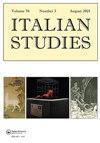纪念:迈克尔·凯撒教授(1945–2022)
IF 0.2
3区 文学
0 HUMANITIES, MULTIDISCIPLINARY
引用次数: 0
摘要
英国伯明翰大学(University of Birmingham)意大利研究名誉教授迈克尔·凯撒(Michael Caesar)或迈克(Mike)(对我们许多人来说都是如此),在他漫长的意大利研究生涯中,给许多认识他的学术同事留下了持久的影响。他毕业于剑桥三一学院现代语言专业,不久后就进入肯特大学工作。1994年,他被任命为伯明翰大学意大利研究系主任,一直任职至2014年退休。他经常出席意大利研究学会的会议,并通过其令人印象深刻的广泛工作为意大利研究做出了巨大贡献:这包括他的专著《翁贝托生态:哲学、符号学和小说作品》(剑桥:Polity,1999);与Ann Hallamore Caesar合著的《现代意大利文学》(剑桥:Polity,2007);编辑过的合集,如但丁。《关键遗产》(纽约:劳特利奇,1996年);《现代意大利文化中的口语与识字》,与Marina Spunta合著(纽约:劳特利奇,2006年);加埃塔诺·德拉·沃尔佩、埃科、新先锋派、佛朗哥·莫雷蒂的许多质疑理论反思的文章;以及对现代意大利主要作家的分析,包括Elsa Morante、Pier Paolo Pasolini、Italo Calvino和Gianni Celati。迈克的出版物在关键方面帮助打开了意大利研究领域的大门,在学术上对以前没有探索过的主题和作者给予了认真的关注,努力解决复杂的理论思想,并建立了跨流派、跨时期和跨主题的联系。他最重要的贡献可能是他对贾科莫·利奥帕尔迪的研究:迈克于1998年在伯明翰建立了利奥帕尔德中心,这导致了一系列令人兴奋的博士项目和重要出版物,这些项目和出版物对利奥帕尔迪研究具有变革性。他还与Franco D’Intino一起编辑了Leopardi笔记本的第一个完整的批判性英文版《Zibaldone》,由Kathleen Baldwin、Richard Dixon、David Gibbons、Ann Goldstein、Gerry Slowey、Martin Thom和Pamela Williams翻译(纽约:Farrar、Straus和Giroux,2013)。在接下来的内容中,几位同事还记得迈克的幽默、对意大利文化的热情,以及他对自己和意大利研究领域的影响。这些记忆证实了我们与学术同事的关系对我们自己和后代学者来说是多么具有变革性。它们揭示了构成学术生涯的多种多样的活动:个人和合作研究项目;教学辅导;制定部门、方案和学科本身;引发更广泛的争论。此外,这些回忆揭示了看似微小的时刻是如何以惊人的清晰度留在我们身边的,以及被善意和准确地倾听的重要性。迈克是一个伟大的(严格的)听众,在意大利研究中也是一个充满活力的存在,我们将非常怀念他。我们向他的遗孀Ann Hallamore Caesar(华威大学意大利语名誉教授)及其家人表示最深切的同情。本文章由计算机程序翻译,如有差异,请以英文原文为准。
In Memoriam: Professor Michael Caesar (1945–2022)
Michael Caesar, Emeritus Serena Professor of Italian Studies at the University of Birmingham (UK), or Mike (as he was to many of us), left a lasting impact on many academic colleagues who came to know him over his long career in Italian Studies. Having graduated in Modern Languages from Trinity Hall, Cambridge he took up a position at the University of Kent soon after. In 1994 he was appointed as Chair of Italian Studies at the University of Birmingham, where he remained until his retirement in 2014. He was a regular presence at Society for Italian Studies conferences, and contributed greatly to Italian Studies research through his impressively wide-ranging work: this includes his monograph on Umberto Eco: Philosophy, Semiotics, and the Work of Fiction (Cambridge: Polity, 1999); the coauthored book, with Ann Hallamore Caesar, Modern Italian Literature (Cambridge: Polity, 2007); edited collections, such as Dante. The Critical Heritage (New York: Routledge, 1996); Orality and Literacy in Modern Italian Culture, co-edited with Marina Spunta (New York: Routledge, 2006); many articles interrogating theoretical reflections by Gaetano Della Volpe, Eco, the neo-avantgarde, Franco Moretti; and analyses of key modern Italian authors, including Elsa Morante, Pier Paolo Pasolini, Italo Calvino, and Gianni Celati. Mike’s publications helped to open up the field of Italian Studies in crucial ways, paying serious scholarly attention to topics and authors that had not previously been explored, grappling with complex theoretical ideas and making connections across genres, periods, and themes. His most significant contribution is perhaps his work on Giacomo Leopardi: Mike established the Leopardi Centre at Birmingham in 1998, which led to a swathe of exciting Ph.D. projects and important publications that were transformative for Leopardi Studies. Together with Franco D’Intino he also edited the first complete critical English edition of Leopardi’s notebooks, the Zibaldone, with translations by Kathleen Baldwin, Richard Dixon, David Gibbons, Ann Goldstein, Gerry Slowey, Martin Thom and Pamela Williams (New York: Farrar, Straus and Giroux, 2013). In what follows, several colleagues remember Mike’s good humour, passion for Italian culture, and his impact on themselves and on the field of Italian Studies. These memories confirm how transformative our relationships with academic colleagues can be, to ourselves, and for future generations of scholars. They reveal the many and variegated activities that make up an academic career: individual and collaborative research projects; teaching; mentoring; developing departments, programmes, and the discipline itself; opening up broader debate. Moreover, these recollections reveal how seemingly small moments can remain with us with startling clarity, and the importance of being listened to with kindness as well as with exactitude. Mike was a great (and exacting) listener, as well as a dynamic presence in Italian Studies, and he will be greatly missed. We extend our deepest sympathies to his widow, Ann Hallamore Caesar (Professor Emeritus of Italian, University of Warwick) and to his family.
求助全文
通过发布文献求助,成功后即可免费获取论文全文。
去求助
来源期刊

Italian Studies
Multiple-
CiteScore
0.40
自引率
0.00%
发文量
47
期刊介绍:
Italian Studies has a national and international reputation for academic and scholarly excellence, publishing original articles (in Italian or English) on a wide range of Italian cultural concerns from the Middle Ages to the contemporary era. The journal warmly welcomes submissions covering a range of disciplines and inter-disciplinary subjects from scholarly and critical work on Italy"s literary culture and linguistics to Italian history and politics, film and art history, and gender and cultural studies. It publishes two issues per year, normally including one special themed issue and occasional interviews with leading scholars.The reviews section in the journal includes articles and short reviews on a broad spectrum of recent works of scholarship.
 求助内容:
求助内容: 应助结果提醒方式:
应助结果提醒方式:


